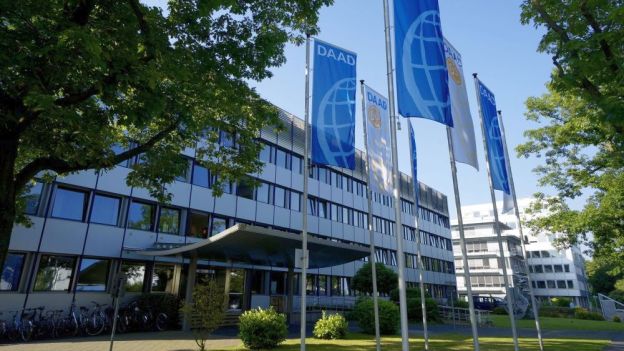
Deutscher Akademischer Austauschdienst (DAAD) is inviting UGM to be one of partner institution in their In-Country/In-Region-Program for students/graduates from South East Asia for the intakes 2024-2026. This program in funded by the Federal Ministry for Economic Cooperation and Development (BMZ).
This opportunity is open to all departments/majors at UGM.
What are the programme’s background and objectives?
The In-Country/In-Region scholarship programme aims at fostering strong, internationally oriented higher education systems in South East Asia with the capacity to contribute to sustainable development. . To this end, scholarships are granted for development-related Master or doctoral studies for individuals who plan to pursue a career in teaching and/or research at a higher education institution in South East Asia
Scholarships are awarded only for selected (post)graduate programmes at host institutions that are affiliated with the programme.
This call for applications is therefore aimed at South East Asian higher education institutions wishing to participate as host institutions in the programme. The selected host institution will be affiliated with the programme for three intakes starting with intake 2024 and ending with intake 2026. Afterwards it is possible to reapply for participation.
By training future academic and professional leaders, the programme contributes to the following long-term impacts:
- Qualified professionals’ involvement in the solution of development-related problems in South East Asia
- Graduates strengthening education and research in South East Asia
- Structural strengthening and regional networking of partner institutions and partner universities
To achieve these long-term impacts, the following outcomes have been formulated as programme objectives:
- Programme objective 1: Graduates are qualified to take on responsible positions in or for their region of origin
- Programme objective 2: The participation of women and underprivileged groups is reinforced
- Programme objective 3: Organisational, financial and personal capacities of partner institutions are strengthened
How is the programme monitored?
With the aim of achieving the above-mentioned objectives, the programme will be monitored through a results-oriented monitoring. Selected host institutions are expected to actively participate by submitting an annual report, for which a template is provided by DAAD. In addition, DAAD carries out a graduate survey at the end of the scholarship and 3 years after the scholarship in order to gather data on the development of the scholarship competencies’ and careers. Participating higher education institutions will be asked to provide up-to-date contact details of their graduates.
Who is eligible for the application?
South East Asian universities, research institutes and (research) networks that offer high quality Master programmes, doctoral programmes, or individual doctorates which are geared towards capacity building of teaching and research staff. Part-time programmes cannot be funded within this programme.
Applying networks need to define and provide detailed information on all member institutions where scholarship holders will be admitted.
The application may only be submitted for (post)graduate programmes that have been accredited. All applying institutions need to prove that at least one intake of the respective study or research programmes has graduated successfully.
Which subject areas are eligible for funding?
The offered Master programmes, doctoral programmes, or individual doctorates need to focus on subject areas with strong relevance to national and/or regional development plans with a clear and strong linkage between the Sustainable Development Goals (SDGs) and the content/focus of the programme and/or the future employment fields of the graduates (including the applied social sciences, environmental and other special areas of law but excluding the fine arts). The humanities might be considered in exceptional cases only if the aforementioned conditions are met. Specialised training programmes cannot be funded.
Application process and required documents
Mandatory forms and other application documents:
- Form “DAAD application”, to be filled out and submitted online – along with the annexes – via the following link: https://www.daad.de/surveys/837127?lang=en
- Annex I: Endorsement of the leadership of the applying university/institute/network (DAAD form)
- Annex II: Staff list of the (post)graduate programme/Supervisor list (DAAD form)
- Annex III: Accreditation certificate(s) of each (post)graduate programmes
- Annex IV: Organizational chart of the applying department
- Annex V: Academic calendar of the applying department as well as
For each of the (post)graduate programme tracks listed in the form “DAAD application”:
- Annex VI: Proposal form (→DAAD Form)
- In the proposal form, the applying department addresses the selection criteria (1-7) stated in this call for applications. If necessary, the following mandatory information can be handed as additional documents:
- results of tracer studies and alumni evaluation
- national/regional development plans
- marketing/admission concept
- support concept
- staff development concept
- In the proposal form, the applying department addresses the selection criteria (1-7) stated in this call for applications. If necessary, the following mandatory information can be handed as additional documents:
- Annex VII: Module book/course plan for each (post)graduate programme track mentioned in the application; research areas for future PhD scholars
- Annex VIII: Study/Course schedule
- Annex IX: Official fee structure with university seal of each (post)graduate programme (if different) + additional explanation how the fees are used and distributed. (→DAAD Form)
- Annex X: Statistical information form of each (post)graduate programme track (DAAD Form)
Statistics on applications, students, alumni, graduation rates, dropout rates
If applicable:
- Marketing samples (e.g., flyer)
- Additional documents addressing the selection criteria
IMPORTANT NOTE:
- One proposal proposed by a department with a maximum of 3 proposed program studies (can be Master or Doctoral degree).
- Each department needs to submit a proposal along with the necessary Annex(es) to the Sub directorate for International Partnerships (KUI) via email head-oia@ugm.ac.id with the email subject “DAAD Proposal 2023” no later than 20 January 2023.
- If we receive more than 3 proposals, the endorsement letter will be granted only to 3 departments after a close internal review.
For further information, please contact KUI via email head-oia@ugm.ac.id.

Recent Comments